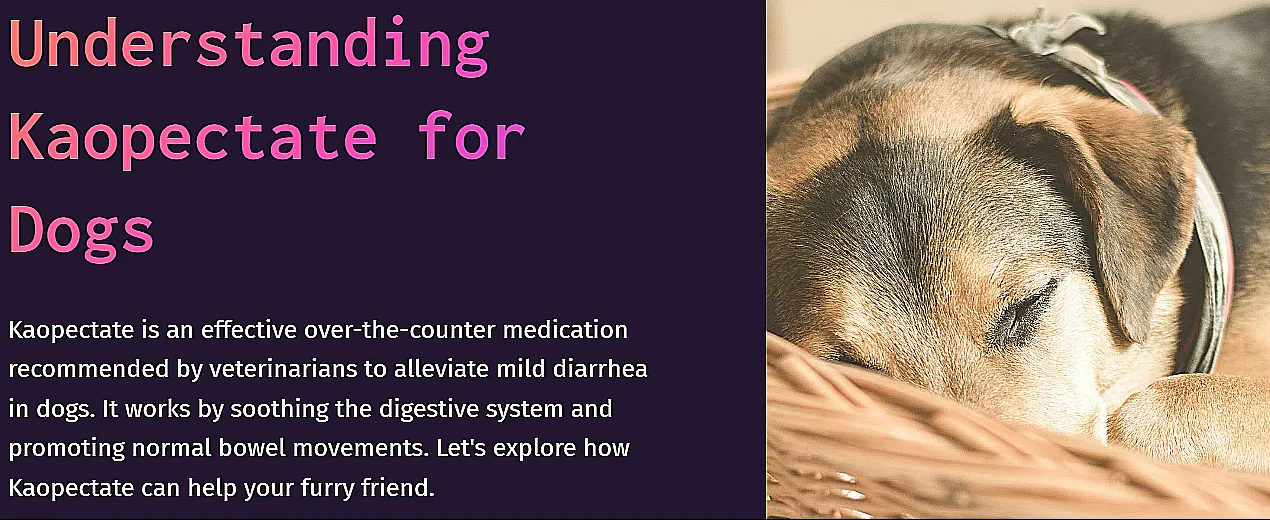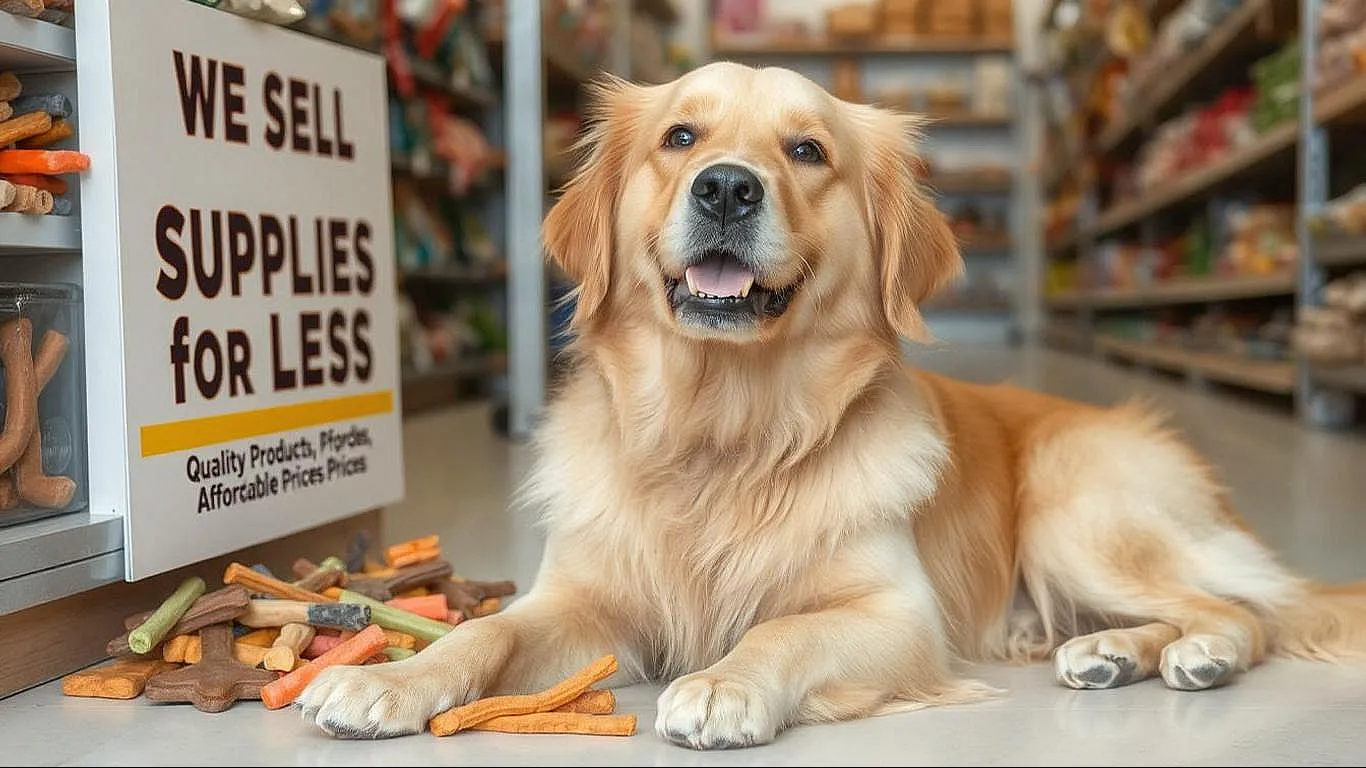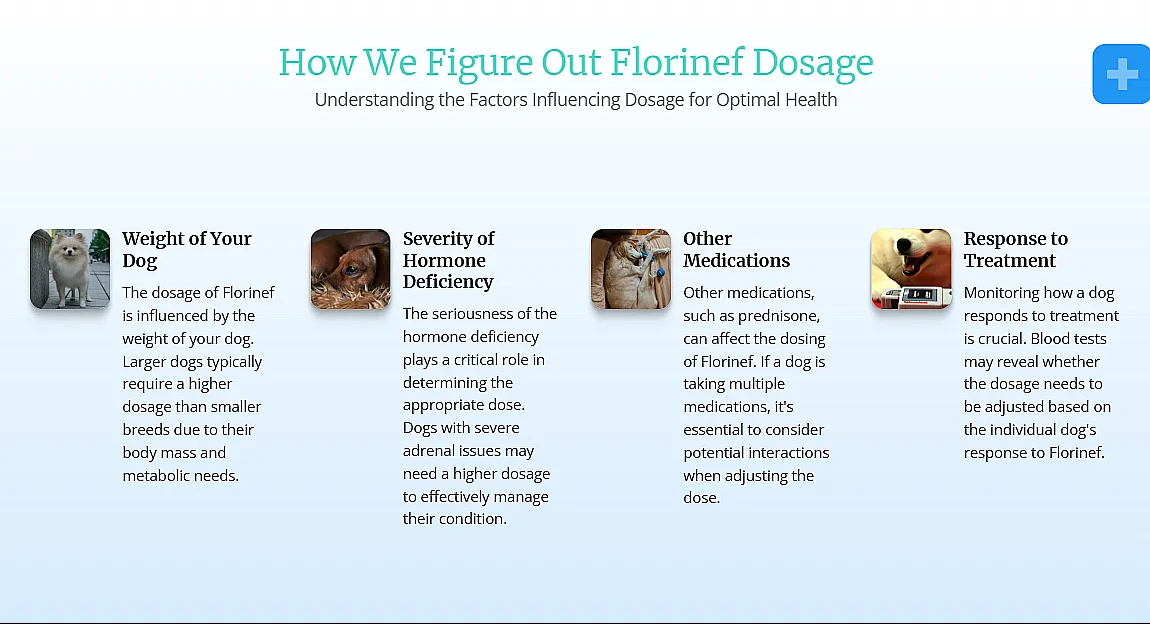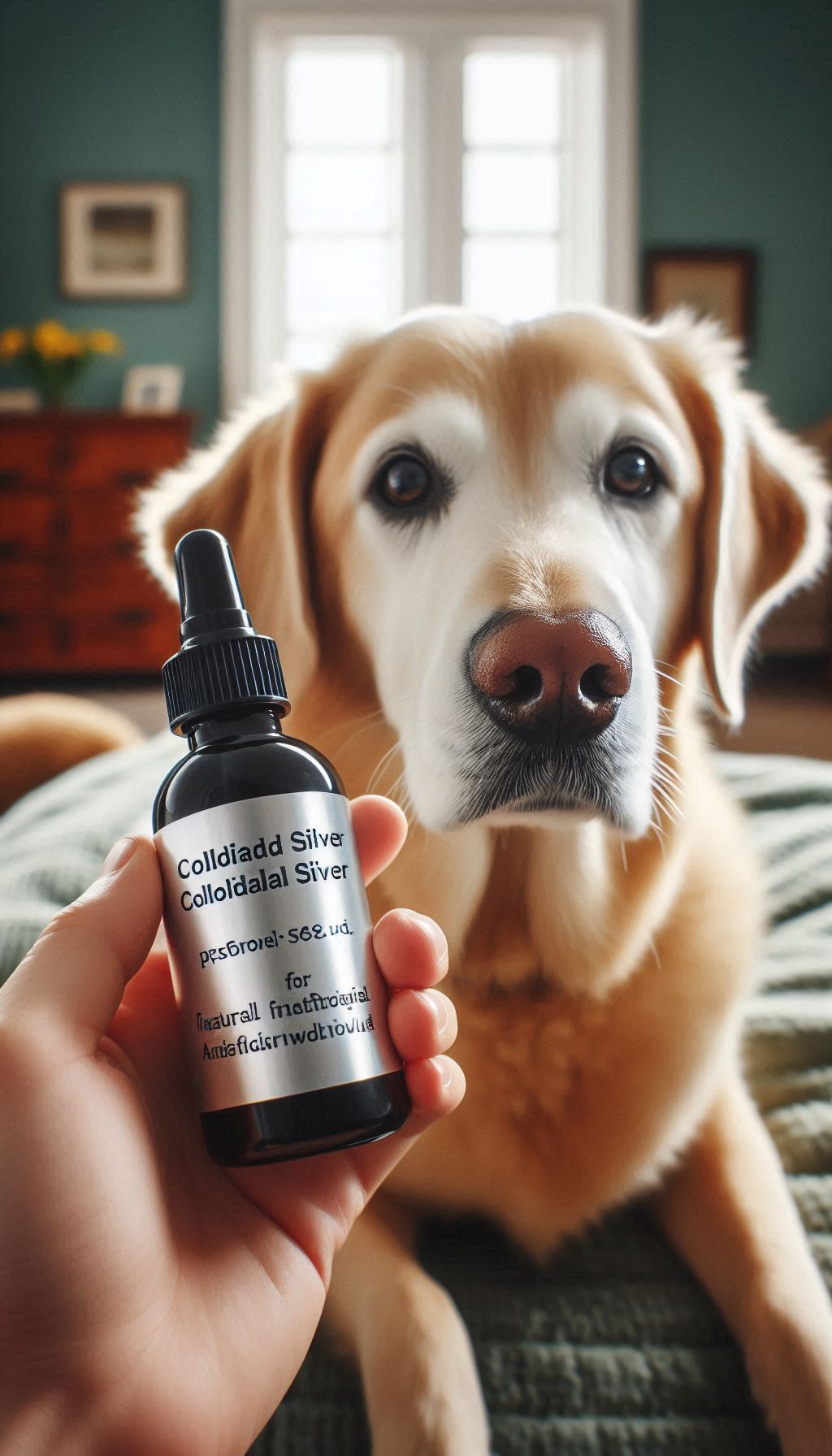Understanding Kaopectate for Dogs
What is Kaopectate and how does it work for dogs?
Kaopectate is an over-the-counter drug that is sometimes recommended by veterinarians for dogs experiencing gastrointestinal upset, particularly mild diarrhea.
It contains kaolin and pectin as its active ingredients, which work together to help soothe the digestive system and alleviate symptoms of diarrhea.
Kaolin acts as a gentle absorbent, helping to bind toxins and remove them from the body, while pectin forms a protective coating on the lining of the intestines, reducing irritation and promoting normal bowel movements.
Is Kaopectate safe for dogs and potential side effects?
While Kaopectate can provide relief for some gastrointestinal issues in dogs, it is important to consult with a veterinarian before administering this medication.
Every dog is unique, and your veterinarian will have full access to your dog’s medical history and specific condition, allowing them to make the best recommendation for your pet’s needs.
It is essential to remember that self-medicating your dog can be risky, as certain medications may not be suitable or may interact negatively with other medications your dog may be taking.
Furthermore, some underlying health conditions may require a different treatment approach altogether. Always follow your veterinarian’s guidance and do not give Kaopectate to your dog unless directed to do so.
If your dog develops diarrhea, contact your veterinarian immediately for appropriate advice and treatment.
Common Uses of Kaopectate for Dogs
Treating diarrhea in dogs with Kaopectate
When it comes to treating diarrhea in dogs, Kaopectate is sometimes recommended by veterinarians.
The active ingredients in Kaopectate, kaolin and pectin, work together to soothe the digestive system and alleviate symptoms of diarrhea.
Kaolin acts as a gentle absorbent, helping to bind toxins and remove them from the body, while pectin forms a protective coating on the lining of the intestines, reducing irritation and promoting normal bowel movements.
However, it is important to note that you should not give Kaopectate to your dog unless directed by your veterinarian.
Your veterinarian has full access to your dog’s medical history and is the best person to make an appropriate recommendation for your dog’s specific condition.
Self-medicating your dog can be risky, as certain medications may not be suitable or may interact negatively with other medications your dog may be taking.
Additionally, some underlying health conditions may require a different treatment approach altogether.
If your dog develops diarrhea, it is crucial to contact your veterinarian immediately for appropriate advice and treatment.
They will be able to assess your dog’s condition and provide the necessary guidance to address the underlying cause of the diarrhea and alleviate their discomfort.
Kaopectate for dogs with upset stomach and vomiting

In addition to treating diarrhea, Kaopectate can also be used to relieve symptoms of an upset stomach and vomiting in dogs.
Just like in the case of diarrhea, it is essential to consult with your veterinarian before administering Kaopectate to your dog.
Your veterinarian will be able to evaluate your dog’s condition and determine if Kaopectate is the appropriate treatment option.
It is important to remember that every dog is unique, and their specific condition and medical history should be taken into consideration when determining the best course of action.
Your veterinarian is the most qualified person to provide guidance and ensure the well-being of your furry companion.
Always follow your veterinarian’s advice and avoid self-medicating your dog without proper professional guidance.
The health and safety of your dog should always be the top priority, and working closely with your veterinarian will help ensure the best possible treatment outcome.
Dosage and Administration of Kaopectate for Dogs
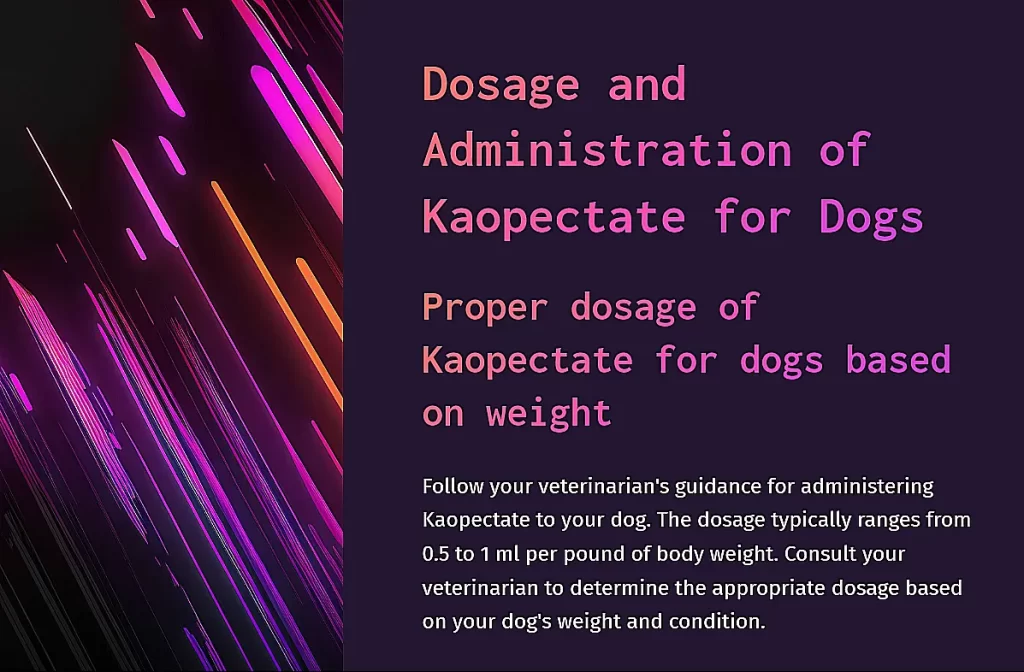
Proper dosage of Kaopectate for dogs based on weight
When it comes to administering Kaopectate to your dog, it is essential to follow your veterinarian’s guidance and recommendations.
The dosage of Kaopectate for dogs typically ranges from 0.5 to 1 ml per pound of body weight. However, the exact dosage may vary depending on the concentration of the medication and the specific needs of your dog.
It is crucial to consult with your veterinarian to determine the appropriate dosage based on your dog’s weight and condition.
It is important to note that Kaopectate comes in liquid form, and it is typically administered orally.
To ensure accurate dosing, it is recommended to use a syringe or a dropper specifically designed for pet medications. This will help you measure and administer the correct dosage.
How to administer Kaopectate to dogs for best results
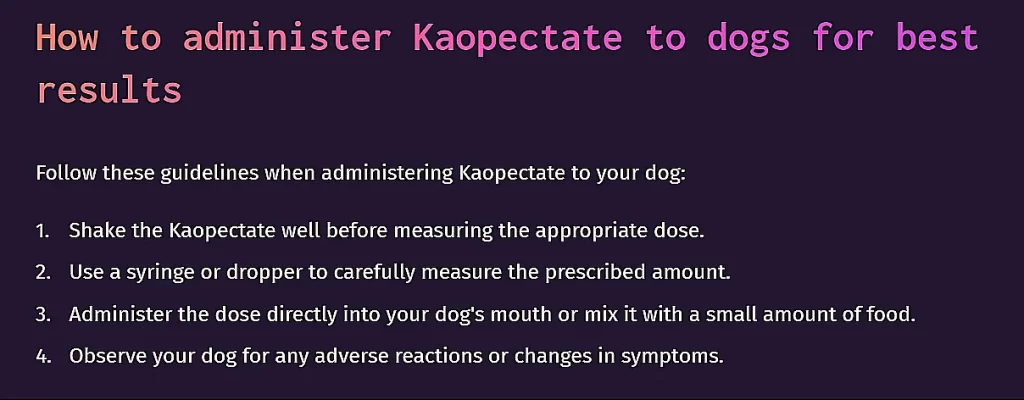
When administering Kaopectate to your dog, it is important to carefully follow the instructions provided by your veterinarian. Here are some general guidelines:
- Shake the Kaopectate bottle well before use to ensure proper mixing of the contents.
- Use a syringe or dropper to measure the appropriate dosage of Kaopectate based on your dog’s weight.
- Gently open your dog’s mouth and place the syringe or dropper between their cheek and gums.
- Slowly and steadily, dispense the Kaopectate into your dog’s mouth, allowing them to swallow it.
- Ensure that your dog has access to plenty of fresh water during the treatment period.
It is important to note that Kaopectate should not be administered for more than 48 hours without veterinary guidance.
If your dog’s condition does not improve or worsens, or if they experience any adverse reactions, contact your veterinarian immediately.
Remember, always consult your veterinarian before providing any medication to your dog, especially if they are currently on other medications.
Your veterinarian will consider your dog’s specific needs and medical history to provide the most appropriate treatment plan for their well-being.
Keep up the good work!
Precautions and Considerations When Using Kaopectate for Dogs
Consulting with a veterinarian before giving Kaopectate to dogs
Before giving your dog Kaopectate or any medication, it is crucial to consult with a veterinarian.
Your veterinarian will be able to assess your dog’s specific condition and determine if Kaopectate is the appropriate treatment option.
They will consider factors such as your dog’s medical history, current medications, and any underlying health conditions.
While Kaopectate is generally safe for dogs, it is important to note that not all dogs will tolerate it well.
Some dogs may be sensitive or allergic to the active ingredients in Kaopectate, such as aspirin.
Additionally, certain medical conditions or medications that your dog is taking may interact with Kaopectate, leading to potential side effects.
Possible contraindications and precautions for specific dog breeds
Certain dog breeds may be more prone to specific medical conditions or have sensitivities to certain medications.
It is important to be aware of any breed-specific contraindications or precautions when considering the use of Kaopectate for your dog.
For example, some breeds, such as Greyhounds, may have a higher risk of developing gastrointestinal issues or drug sensitivities.
In these cases, your veterinarian may recommend alternative treatments or a modified dosage of Kaopectate.
Overall, it is essential to prioritize your dog’s safety and well-being by consulting with a veterinarian before giving them any medication, including Kaopectate.
Your veterinarian will provide individualized guidance and ensure that the treatment plan is suitable for your dog’s specific needs.
Alternative Options to Kaopectate for Dogs
When it comes to treating diarrhea and upset stomach in dogs, there are several alternative options to consider before resorting to Kaopectate or any other medication.
These natural remedies and over-the-counter medications can provide relief for your dog’s gastrointestinal issues without the potential risks associated with certain medications.
Natural remedies for dogs with diarrhea and upset stomach
- Pumpkin: Adding a small amount of plain canned pumpkin to your dog’s diet can help regulate their digestive system and firm up loose stools.
- Probiotics: Giving your dog a probiotic supplement can help restore the balance of good bacteria in their gut, which is essential for proper digestion.
- Boiled chicken and rice: A bland diet consisting of boiled chicken and rice can be gentle on your dog’s stomach and help alleviate diarrhea.
- Ginger: Adding a small amount of ginger to your dog’s food can help reduce inflammation in the digestive system and soothe an upset stomach.
Other over-the-counter medications for dogs with gastrointestinal issues
If natural remedies alone are not providing enough relief for your dog’s gastrointestinal issues, there are other over-the-counter medications that you can discuss with your veterinarian. These include:
- Propectalin: This over-the-counter medication contains kaolin, pectin, and probiotics, which can help absorb toxins in the intestines and provide relief for diarrhea.
- FortiFlora: FortiFlora is a probiotic supplement specifically formulated for dogs and can help improve digestive health and relieve gastrointestinal issues.
Remember, before starting any treatment, it is important to consult with your veterinarian. They will be able to evaluate your dog’s specific condition and recommend the most appropriate course of action to address their gastrointestinal issues effectively and safely.
Frequently Asked Questions about Kaopectate for Dogs
Is Kaopectate safe for puppies and senior dogs?
It is important to note that Kaopectate should not be given to dogs without the direct guidance of a veterinarian.
The safety and appropriateness of Kaopectate for puppies and senior dogs can vary depending on the individual dog’s health condition and medical history.
Therefore, it is crucial to consult with your veterinarian before administering any over-the-counter medications like Kaopectate to your dog.
Puppies and senior dogs may have specific health concerns that require a different treatment approach, and your veterinarian is the best person to make an informed recommendation based on their knowledge of your dog’s medical history and current health status.
It is always better to err on the side of caution and seek professional advice before giving any medications to your dog.
Can Kaopectate be used for chronic or long-term diarrhea?
Kaopectate is typically not recommended for chronic or long-term diarrhea in dogs.
While it may provide temporary relief for occasional gastrointestinal upsets, chronic diarrhea often indicates an underlying health issue that requires proper diagnosis and treatment.
If your dog is experiencing chronic or long-term diarrhea, it is crucial to contact your veterinarian right away.
They will be able to evaluate your dog’s specific condition, conduct any necessary tests, and recommend the appropriate treatment plan.
It is essential to address the underlying cause of the diarrhea rather than relying solely on over-the-counter medications.
Your veterinarian will have access to your dog’s medical history and can provide valuable guidance to manage their symptoms effectively.
Remember, your veterinarian is your best resource for personalized advice and recommendations for your dog’s health.
Potential Side Effects of Kaopectate for Dogs

Common side effects of Kaopectate in dogs
While Kaopectate is generally well-tolerated by dogs, there are some common side effects that pet owners should be aware of.
These side effects may include an upset stomach or constipation, which can be mild and temporary. However, some dogs may experience more serious side effects, such as abdominal pain, dark or tarry stools, extreme thirst, fever, lethargy, dizziness, or changes in stool color.
If any of these side effects are observed, it is important to contact your veterinarian for further guidance.
Rare but serious adverse reactions to Kaopectate for dogs

In rare cases, dogs may experience serious adverse reactions to Kaopectate.
These reactions can include allergic reactions such as swelling, hives, or trouble breathing. If any signs of an allergic reaction are noticed, it is essential to stop giving Kaopectate and seek immediate veterinary care.
Additionally, an overdose of Kaopectate can be life-threatening for dogs. Symptoms of an overdose may include diarrhea, lethargy, vomiting, weakness, panting, loss of appetite, abdominal pain, seizures, and kidney problems.
If you suspect an overdose or if your dog’s condition worsens or does not improve with treatment, it is crucial to contact your veterinarian right away.
It is always recommended to consult with your veterinarian before giving any over-the-counter medications, including Kaopectate, to your dog.
Your veterinarian will be able to provide personalized advice and guidance based on your dog’s specific health condition and medical history.
When to Seek Veterinary Help for Dogs with Gastrointestinal Issues
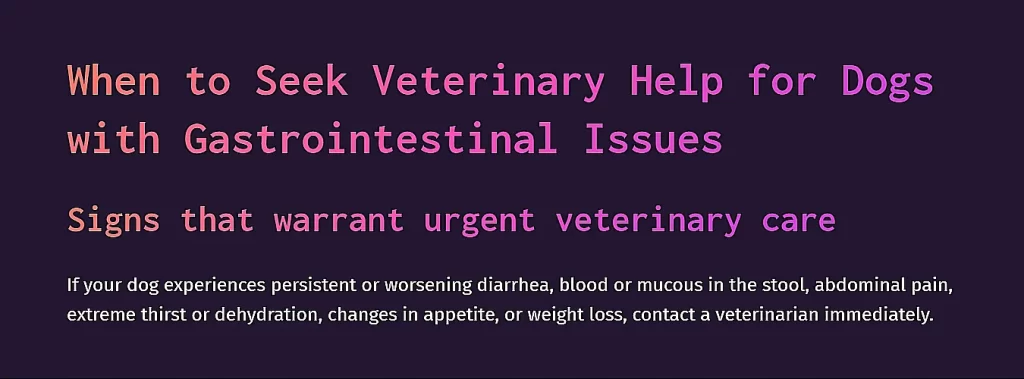
Signs and symptoms that warrant urgent veterinary care
When it comes to gastrointestinal issues in dogs, it’s essential to pay attention to any signs or symptoms that may indicate a more serious condition.
While some gastrointestinal issues can be mild and resolve on their own, others may require immediate veterinary intervention.
Here are some signs and symptoms that warrant urgent veterinary care:
- Persistent or worsening diarrhea: If your dog’s diarrhea persists or gets worse, it may indicate an underlying problem that needs to be addressed by a veterinarian.
- Blood or mucous in the stool: The presence of blood or mucous in the stool can be an indication of a more severe gastrointestinal issue that requires veterinary attention.
- Abdominal pain or discomfort: If your dog shows signs of abdominal pain, such as whining, restlessness, or reluctance to move, it’s crucial to seek veterinary help.
- Extreme thirst or dehydration: Excessive thirst or signs of dehydration, such as dry gums, sunken eyes, or lethargy, should not be ignored and necessitate veterinary care.
- Changes in appetite or weight loss: If your dog has a sudden loss of appetite or experiences unexplained weight loss, it may be indicative of an underlying gastrointestinal problem that needs to be addressed by a veterinarian.
When to stop using Kaopectate and consult a veterinarian
While Kaopectate can provide relief for dogs with gastrointestinal issues, it’s important to know when to discontinue its use and consult a veterinarian.
Here are some situations in which you should stop using Kaopectate and seek veterinary advice:
- No improvement or worsening of symptoms: If your dog’s symptoms do not improve or worsen despite using Kaopectate, it’s time to consult a veterinarian. This may signify a more serious underlying condition that requires medical attention.
- Allergic reactions: If your dog exhibits signs of an allergic reaction, such as swelling, hives, or difficulty breathing, discontinue the use of Kaopectate immediately and seek veterinary care.
- Overdose symptoms: If you suspect that your dog has ingested an excessive amount of Kaopectate or if they display symptoms of an overdose, such as vomiting, weakness, seizures, or kidney problems, contact your veterinarian right away.
Conclusion and Final Thoughts on Using Kaopectate for Dogs
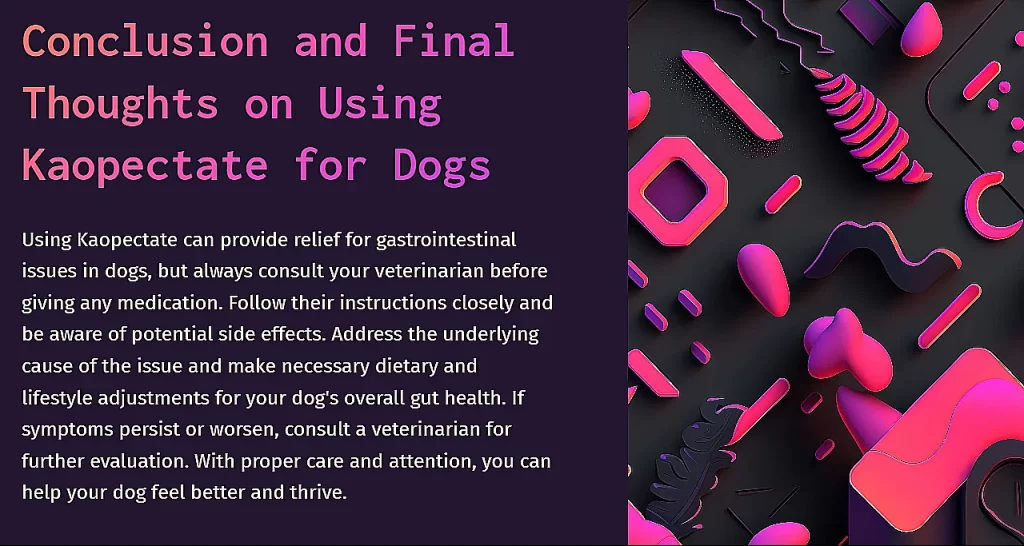
Summary of key points about Kaopectate for dogs
Using Kaopectate for dogs can provide relief for gastrointestinal issues such as diarrhea and upset stomach.
It is an over-the-counter drug that some veterinarians may recommend for dogs. However, it is important to always consult with your veterinarian before giving any medication to your dog, including Kaopectate.
They can provide personalized advice and guidance based on your dog’s specific health condition and medical history.
When using Kaopectate for dogs, it is essential to follow your veterinarian’s instructions closely.
The dosage and duration of use may vary depending on the individual dog and the severity of the gastrointestinal issue. It is also important to be aware of any potential side effects or adverse reactions that your dog may experience while on Kaopectate.
Considerations for using Kaopectate as part of a dog’s healthcare plan
While Kaopectate can be beneficial for dogs with gastrointestinal issues, it should not be seen as a standalone solution.
It is important to address the underlying cause of the gastrointestinal problem and make necessary dietary and lifestyle adjustments to promote your dog’s overall gut health.
Additionally, if your dog’s symptoms do not improve or worsen despite using Kaopectate, it is crucial to consult with a veterinarian.
Persistent or worsening symptoms may indicate a more serious underlying condition that requires medical attention.
In conclusion, Kaopectate can be a useful tool in managing gastrointestinal issues in dogs, but it should always be used under the guidance of a veterinarian.
With proper care, attention to symptoms, and a holistic approach to your dog’s overall health, you can help your furry friend feel better and thrive.






